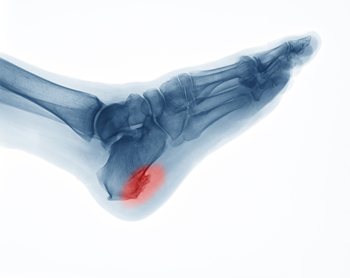Heel Spurs May or May Not Cause Pain
Tuesday, 20 September 2022 00:00
Heel spurs are small, bony growths on the heel of the foot. A spur may grow when the plantar fascia ligament that connects the heel bones to the toe bones become inflamed. The inflammation from a heel spur might cause discomfort or not. If it does hurt, there will be pain or tenderness over the weight-bearing part of the bottom of the heel. A bump can sometimes be felt when the area is touched. A spur will not be treated unless other conditions caused by inflammation causing the pain are non-existent. For example, plantar fasciitis may be the main source of pain, and that condition will be treated and the bone spur left alone. If you have a bone spur and pain, see a podiatrist to find out the source of pain so you can receive appropriate treatment options.
Heel spurs can be incredibly painful and sometimes may make you unable to participate in physical activities. To get medical care for your heel spurs, contact one of our podiatrists from North Bay Ankle & Foot Center. Our doctors will do everything possible to treat your condition.
Heels Spurs
Heel spurs are formed by calcium deposits on the back of the foot where the heel is. This can also be caused by small fragments of bone breaking off one section of the foot, attaching onto the back of the foot. Heel spurs can also be bone growth on the back of the foot and may grow in the direction of the arch of the foot.
Older individuals usually suffer from heel spurs and pain sometimes intensifies with age. One of the main condition's spurs are related to is plantar fasciitis.
Pain
The pain associated with spurs is often because of weight placed on the feet. When someone is walking, their entire weight is concentrated on the feet. Bone spurs then have the tendency to affect other bones and tissues around the foot. As the pain continues, the feet will become tender and sensitive over time.
Treatments
There are many ways to treat heel spurs. If one is suffering from heel spurs in conjunction with pain, there are several methods for healing. Medication, surgery, and herbal care are some options.
If you have any questions feel free to contact our offices located in Petaluma and Sonoma, CA . We offer the latest in diagnostic and treatment technology to meet your needs.




